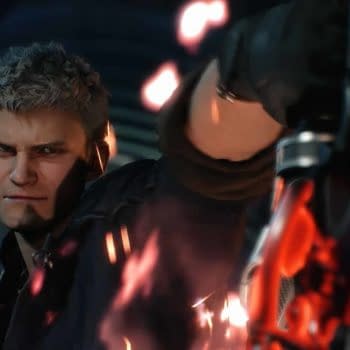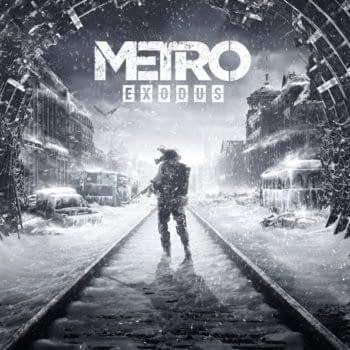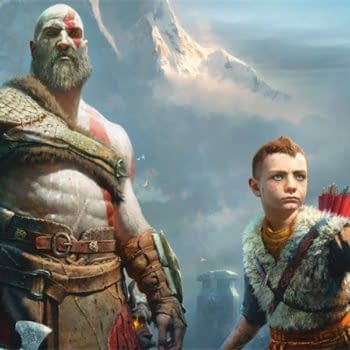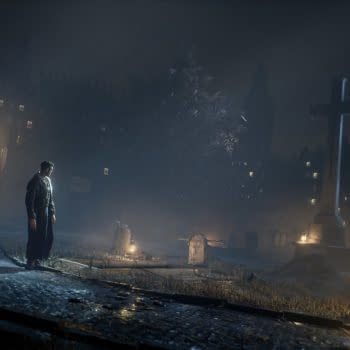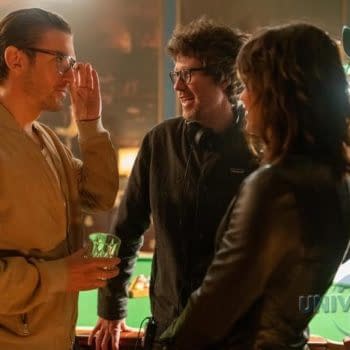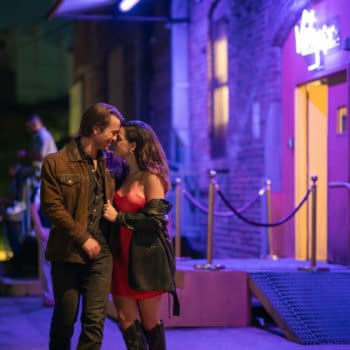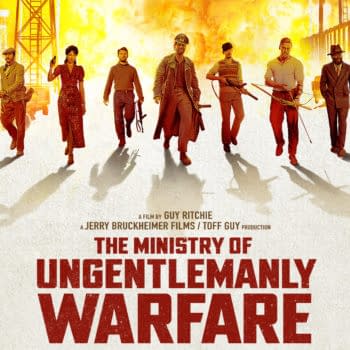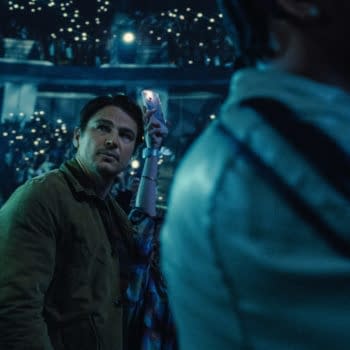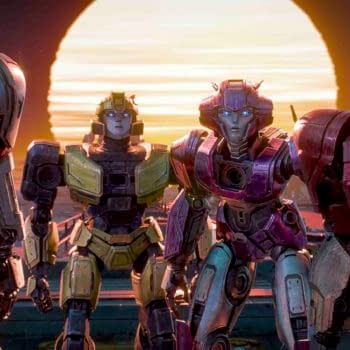Posted in: Movies, Recent Updates | Tagged: byron howard, disney, disney animation studios, rich moore, zootopia, zootropolis
Interview: Zootropolis Directors Rich Moore And Byron Howard Contemplate Social Politics, Bullying And The Human Condition
Back in February, I was lucky enough to be invited out to talk to Rich Moore and Byron Howard, two directors on Zootropolis, (or Zootopia if you are most places in the world.) I reviewed the film a while back, and really enjoyed it. What struck me most about it though was that this was a movie with something to say.
While it is not rare to see a family film take on aspects of prejudice and bullying, few do so so overtly. Zootropolis is about prejudice, not just of good and bad characters, but of society as a whole. That's a big, illusive target, but it's fascinating to see Disney try to tackle it anyway through the movie's tun time.
So, with the film finally hitting UK shores this week, I was left with a big question, which I put forth to both directors…
Patrick Dane: Do you think you have made a political movie?
Byron Howard: We don't start off trying to have any sort of intellectual statement or political slant to the film.
Rich Moore: No
BH: This, it evolved very organically because when we were… we do a lot of research into our subjects before we dive in, even before we start writing a story and so for the first year of this film we were doing a lot of research and we looked at the mammal world and we found out that mammals have a very interesting percentage in their world which is 90% of the animals are prey animals and 10% are predators. We actually say that in the movie. And so it's a true fact, you have a majority and a minority, and two groups that don't necessarily always see eye to eye or get along. And that's where a lot of the core conflict in the film started to feed into the story. But, what we love about the movie is that, what I love about it, I love watching Judy who's the main character, and she's a little naïve at first, she's got high expectations of what she can do for the world and what she's capable of, but once she gets to the city I think just seeing her encounter obstacles and these more complex wrinkles in social life, I think it's great. It's a maturation story, so you're watching this story go from a slightly wide-eyed, slightly naïve optimist to an informed optimist.
So, no, we never start that way. But it's interesting that people are talking about it which is great.
RM: And I think that when a movie or painting or any kind of artwork or a book can create self-reflection, because that's basically Judy's story, is thinking that the world and herself is one way, but then through making mistakes, through her flaws, it causes her to take a step back and say 'Well, I did think that I was better than my parents, but my god,, I'm just like them on some level' and owning that. I think that's a great character.
I think that taking someone that seems pure of heart and almost kind of Pollyannaish, and then having her find that there's a part of her that she's not really happy about, and owning it, and moving forward from there is a really cool character. It's the kind of character that I as a kid, or even a young adult, would have been like 'Oh, yeah, I can see it makes me think about this.' I think that's good when artwork can make an audience think. Not just be entertained and not just laugh ,but really kind of examine oneself and think.
PD: What struck it for me was that it's socially and emotionally complex. It's not like it's just 'Oh, everybody's who's good is the good guy'. The prejudice is mixed, right? Do you think it's important, especially in a family movie, to explore these kind of emotionally complex ideas for your characters?
RM: I think it's just good film making. I mean I don't know if it's "important", but it's important if we're making a film that's going to entertain and engage the audience, I think you need characters that aren't just perfect. I do think it would be kind of a preachy story if we're saying 'Look at Judy, she's so perfect, let's all be like Judy who, never makes mistakes and who proves the world wrong and her point of view is the good one.' It's like… I think of her like Pinocchio, if someone was saying 'Is there ties to the old classic Disney films and this one?' Pinocchio is a very appealing character, but he made tons of mistakes along the way, he's just so flawed…
BH: Terrible decisions.
RM: Hugely bad choices.
BH: He wound up in a whale.
PD: At that point you can probably look back at your choices…
BH: 'Maybe I shouldn't go into the whale…'
RM: And I think Judy has a lot of that DNA in her. I think a lot of our characters in the newer films we're doing are not sterling Boy Scout or Pollyanna characters that never make a mistake. In the film, they're characters that have words and learn from their mistakes and grow to be more authentic human beings, or animals in this case.
BH: Yeah, because as we go through the movies we're constantly trying to make the characters feel deeper and more real. So then what happens is that we talk about these characters for months or years and a lot of our own DNA gets in there so our own flaws and foibles and mistakes, we talk a bit, it's like a psychological therapy session for many, as we know each other very well by the time the films are done So we know what we've all gone through and then we bond over that too, and I think when we do find those key experiences that form your outlook on the world then we can put that in the characters as well and then hopefully the audience can relate to what we're talking about.
RM: It comes from having really good leadership at the studio with John Lasseter and Ed Catmull because if you look at the movies that John made, you know, Toy Story, Woody is a very jealous character. We love him, but he has some very human flaws. His jealousy gets the best of him, and that's kind of the impetus of that whole first Toy Story movie. And we don't dislike him. I think we love him more because he's more human and the Disney Animation Studio for a while didn't have leadership like that. They wanted main characters that 'Well, we've got to love them' you know? 'They can't do something wrong. That, would be bad, no one will like them' but really the opposite is true. The more flawed they are, those are the characters that we love. Or at least I do, personally.
BH: Yeah, I agree.
PD: On that angle, you said Woody's quite a human character and what struck me with this film was that, obviously they're all animals, but they're quite human. For you, almost turning that whole thing on its head, how much animal do you think there is in a human being? Especially when watching that first scene when Judy is coming through Zootopia, that struck me as 'Hey, we are all a bit like animals' when you break it down like that
RM: Because I think like animals, we're very social creatures. That's what these guys, they did a huge research trip to Africa, and there was that moment that you [Howard] speak of a lot where at night, the lions are attacking zebras and eating them, but during the day when it's hot and everyone needs water, it's like they put aside the predator-prey thing and they drink together at the waterhole. They need water. They don't attack one another then. That's kind of like the human condition. We are social creatures. Whatever our differences with a different person might be, we live in the same city. We've learned to work together much like the animals, because we are social underneath it all.
I think what's great about the movie is that, a character from that world has taken something that's in the instinct of prey and is manipulating it to their own advantage. And that's kind of where the story came from. It didn't begin as 'I have a theory to test on-screen.' It was more from watching how animals are and how they are like us and then thinking 'Wow, that's cool that there is a majority and minority,' you know? 'Wouldn't it be interesting if someone took advantage of that?'
PD: There's two scenes that really stick out for me, they both caught me and center on the same idea which is the two bully scenes. They're both quite threatening. How did you go about thinking about that in the film language of that? How do you control that scene?
BH: Yeah. Well I think both Richard and I had experiences with bullies growing up. And bullies is another way where two people don't get along and one is sort of trying to overpower the other. Even Shakira, strangely, when we talked to her about the film, she bonded with Judy in a way because she was bullied as a kid and she wanted to be a cop when she was younger…
RM: Growing up in Columbia.
BH: Growing up she hated to see kids, other kids pushing other kids around and she didn't like bullies and she wanted to make the world a better place and she believed in, 'When I grow up I'm going to be about fair play and protect the weak.' So there's something about that, we needed that scene to really awake that spark in Judy
RM: And it came late in the process of building the story. The scene was kind of different before, and it wasn't personifying the theme, you of trying to make the world a better place. It used to be a scene where, Judy was helping someone, but not in the face of being threatened herself. We said 'We're not, we're not doing our story service, if we're not seeing Judy be the recipient of intimidation, or unfairness or injustice.' So the scene came late and we wanted it to feel real. A moment with a bully feels, like Byron said, we've all had those moments, especially as a kid, where someone bigger is intimidating us. But we didn't want it to be so frightening that it would kind of be like 'Oh my god, this is too much. This got just a little too real here'. So it was a delicate scene to work with, because it definitely… we wanted it to be that kind of scene that galvanized in the beginning of the movie like 'This is who our protagonist is, this is what she's fighting against, this is her struggle and this is what we're going to watch pursue throughout the story.'
PD: And, why police?
BH: Why police?
Was it mostly to play with like the genre convention of those buddy cop movies…
BH: Well if you think about it, why would people keep coming back to police stories on TV and in film? Police are kind of fascinating because that's a job where you say, just like we said Shakira said, it's like 'I'm going to go out and make the world a better place. My job is going to be to protect people and to make sure people…
RM: Stand up for the little guys.
BH: Stand up for the little guy, believe in truth and justice.' So there's a superhero quality to cops, in the most ideal view of cops, that I think is appealing to a lot of people, and especially to Judy… Judy is an optimist and she's like 'How can I make the world better?' and she thinks 'Even though I'm small, even though I'm fuzzy and cute, I'm going to do what no one else in my family has done and step out of this box and do something big.' I think we also show sometimes the cops as flawed characters themselves as trying to figure out. Bogo certainly throws obstacles in Judy's way because he doesn't understand what she's after and what she's capable of and he's letting his own blind spots affect her.
We talked to a lot of cops, we talked to male cops and female cops. There was a female cop who came up through the ranks during the 1980s where all the other cops were big strong dudes and they didn't want a female partner because they thought 'Well, a female partner can't keep me safe.'
RM: Right.
BH: And so, it was for their own protection and you understand that people have these challenges, but the fact that, and she even didn't want the other male cops protecting her. She wanted to be seen as an equal and so all of these different things, these different ways of viewing other people come into the movie in subtle ways and are challenges for Judy, but the fact that she surmounts them and…
RM: And, and just from a story perspective, it's, it seemed like a really good underdog situation of putting a rabbit into a situation where she wanted to prove, that she could be just as good as these, other police officers and to play with that feeling that I think a lot of us working on the film had of coming into an industry with all this vigour of like 'I'm going to prove that I can do something' like a lot of us felt getting into animation. But then finding there is a wall, you know, there is a voice of the world that says like 'Well, you think you're pretty good, but we're not just going to let you come in here and, and drive the car. On the first day. We're not just giving you the keys to the kingdom. You have to show us'. So it became, again, like a nice struggle to put Judy up against.
–
There's lots to chew on there, and I really appreciate that there is a big budget family movie soaring through the box office that facilitates these kinds of discussions. Zootropolis feels as timely as ever, and it's already well on its way to being a mega-hit.
If you live in a place where the film is already out, or you're over here in the UK with it coming out this weekend, I really recommend going out and giving it a shot.








